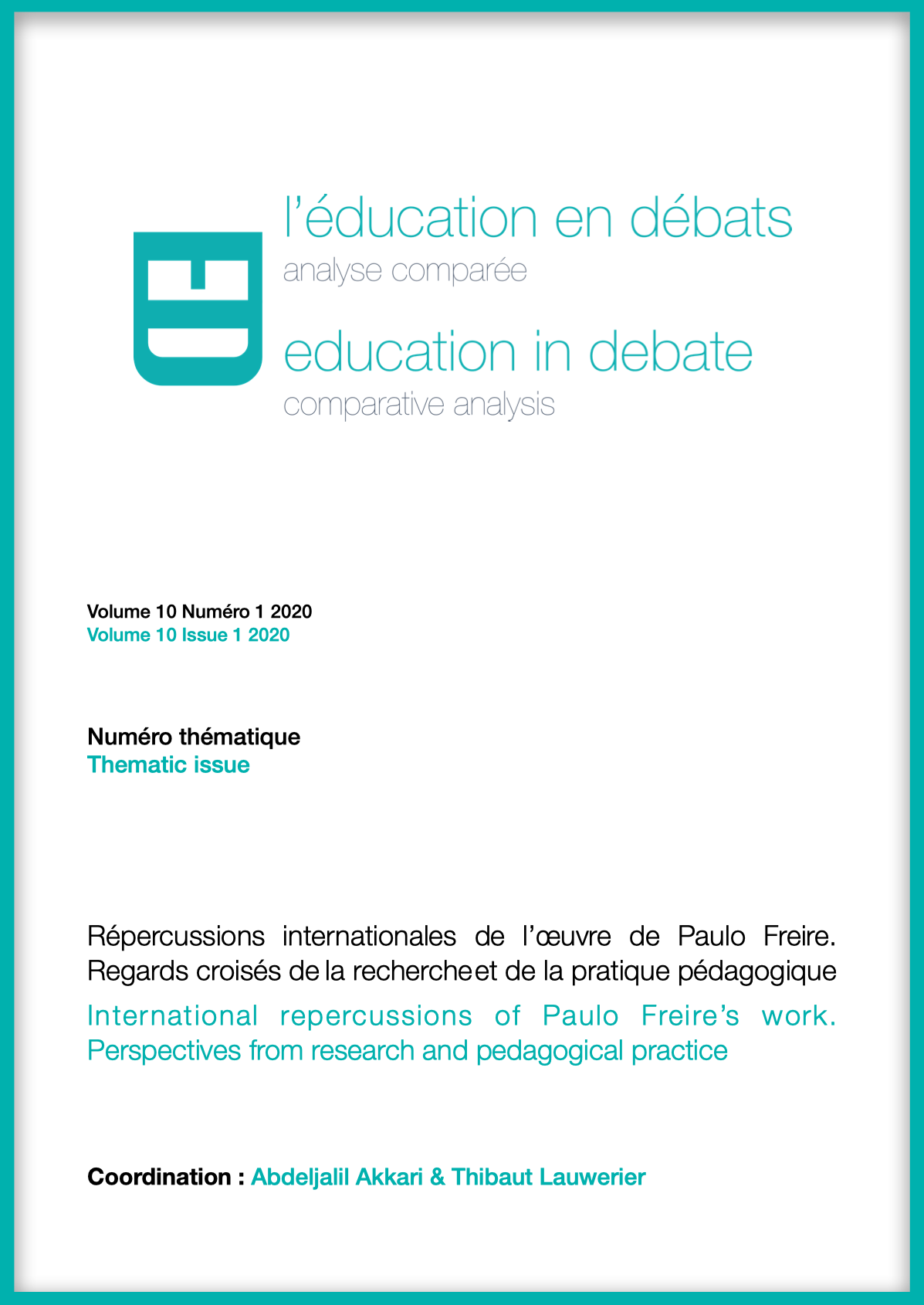O uso de Freire na educação intercultural e educação do campo no Brasil
DOI:
https://doi.org/10.51186/journals/ed.2020.10-1.e282Abstract
Freire’s approach to popular education has had an influence on rural education since the 1960s. The challenges of rural education in Brazil however remain in many ways similar: ensuring the right of access to knowledge for rural populations; ensuring the right to difference and the recognition of rural practices and knowledge; the need to break with the hegemonic paradigm by promoting projects that build and disseminates knowledge that is imbedded in rural culture. Rural education also seeks to respond to the demands of the different communities such as quilombolas, Indigenous Peoples and the diverse groups of rural workers and peasants. In this respect, Freire’s educational proposal remains relevant for today’s rural education due to its dialogical, critical and democratic character. In this paper, we will seek to discuss Freire’s contributions to the historical genesis of intercultural education in Brazil, his thoughts on the relationship between culture and education, and the question of dialogue as a pedagogical strategy for empowering those who suffer from social exclusion.
References
De Oliveira, X. S., Marín Gonzáles, J. & Dominguez Avila, C. F. (2019). Racismo ambiental. Ecología, Educação e Interculturalidade. Campo Grande: Life Editora.
Eribon, D. (2016). Principes d’une pensée critique. Paris : Fayard.
Freire, P. (1974). Pédagogie des opprimés. Paris : Ed. La Découverte.
Freire, P. (1978). La alfabetización y la conciencia. Porto Alegre: Editorial Emma.
Freire, P. (1987). La educación como práctica de la libertad. Rio de Janeiro: Paz e Terra.
Freire, P. (1984). Cartas a Guinea Bissau. Graba u experimento en el proceso. Rio de Janeiro: Paz e Terra.
Freire, P. (1980). Conciencia: La teoría y la prácttca de la liberación. (Antología). Sáo Paulo: Moraës.
Freire, P. (1990). La alfabetización -Lectura del mundo y lectura de la palabra. Rio de Janeiro: Continuum.
Freire, P. (1993). Política y educación. Ensayos. São Paulo: Editora Cortez.
Freire, P. (1995). Pedagogía: diálogo y conflicto. São Paulo: Editora Cortez.
Freire, P. (2000). Pedagogía de la indignación. Cartas pedagógicas en un mundo. São Paulo: UNESP.
Junod, R., Romagnoli, S. & Denevaud, J. M. (2017). L’inquiétude pour la pensée critique. Genève : IES Editions.
Marin, J. (1994). Ethnocentrisme et racisme dans l’histoire européenne dans la cadre de la conquête de l’Amérique et perspective actuelle. In C. Alleman Ghionda (Ed.), MultiKultur und Bildung in Europa. Multiculture et éducation en Europe (pp. 181-196). Berne : Peter Lang.
Marin, J. (2008). Globalization, Education, and Cultural Diversity. In P. R. Dasen & A. Akkari (Eds) Educational Theories and practices from the majority World (pp. 346-366). Los Angeles, London, New York, Singapore: Sage publications.
Marin, J. (2010). Interculturalidade e descolonização do saber: relações entre saber local e saber universal, no contexto da Globalização. Visão Global, 12(2), 122-155.
Marin, J. (2015) Il gene no hanno colore. Rivista pedagógica culturaledel Movimento di Cooperazzione Educativa, 64(1), 64-68.
Marin, J. (2016). Eurocentrismo, racismo e interculturalidadeno contexto da Globalização. In A. Rodrigues Gómes, M. A. Meneses& J. Marin (Eds.), Novas Epistemes e Narrativas contemporánea (pp. 19-52). Campo Grande: Life Editora.
Marin, J. (2017). Parcours existentiels d’un anthropologue, entre Pensée critique et décentration culturelle. In R. Junod, S. Romagnoli & J. -M. Denevaud (Eds.), L’Inquiétude pour le monde et la pensée critique (pp. 72-75). Genève : IES Editions.
Marin, J. & Dasen, P. R. (2007). L’éducation face à la Mondialisation, aux migrations et aux droits de l’homme. In M. -C. Caloz-Tschopp & P. R. Dasen (Eds), Mondialisation, migrations et droits de l’Homme (pp. 285-320). Bruxelles : Bruylant.
Méan, A. & Bossy, M. (2002). La conscientisation à l’Ecole d’études sociales et pédagogiques. Lausanne : ESSP.
ONU. (2020). Rapport sobre Desigualdade social no Brasil Consultadoen http://www.todalapolitica.com/desigualdade-social-brasil
Oxfam. (2019). El 1% de los ricos acumulan el 82% de la riqueza global. Consultado en https://www.bbc.com/mundo/noticias-43776299
Piketty, T. (2013). Le capital au XXI Siècle. Paris : Editions du Seuil.
Quijano, A. (2014). Des/Colonialidad y Bien vivir. Lima: Cátedra América Latina.
Stiglitz, J. (2002). El malestar de la Globalización. Buenos Aires: Taurus.
Stiglitz, J. (2018). The price of inequality. And free fall. New York, NY: W. W. Norton and company.
Stiglitz, J. (2019). People, Power and profits. Progressive capitalism for an age of discontent. New York, NY: W. W. Norton & Company.
Thomson, J. (2019). Synode, une affaire de vie. Consultado en https://www.choisir.ch/religion/eglises/item/3611-synode-une-affaire-de-vie
Vengermeren, W. (2020). O progresso da Redenção. A historia da salvação de criação a nova Jerusalem. São Paulo: Saeed Publicações.
Wallerstein, I. (2008). L’universalisme européen de la colonisation à l’ingérence. New York: Demopolis.
Ziegler, J. (2018). Le capitalisme expliqué à ma jeune-fille (en espérant qu’elle en verra la fin). Paris : Seuil.
Ziegler, J. (2019). Lesbos. La honte de l’Europe. Paris : Seuil.
Downloads
Published
How to Cite
Issue
Section
License
Some rights reserved 2020 The Author(s)

This work is licensed under a Creative Commons Attribution-NonCommercial-NoDerivatives 4.0 International License.




